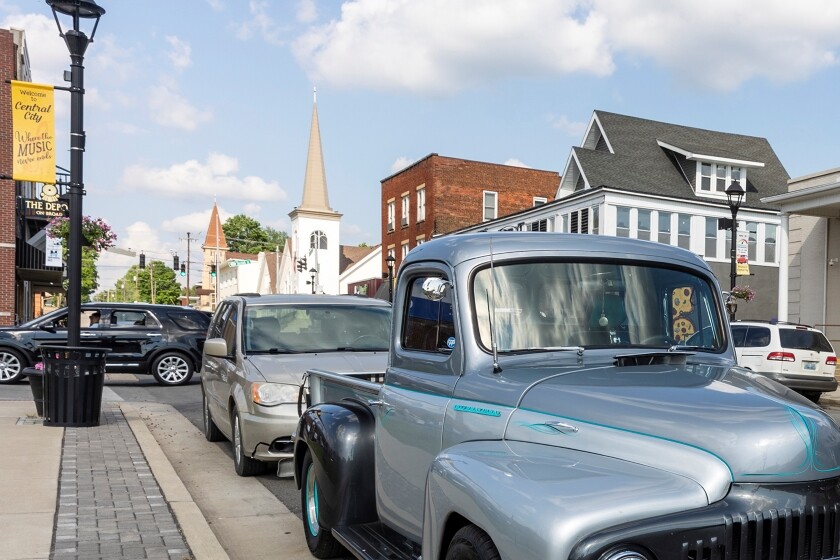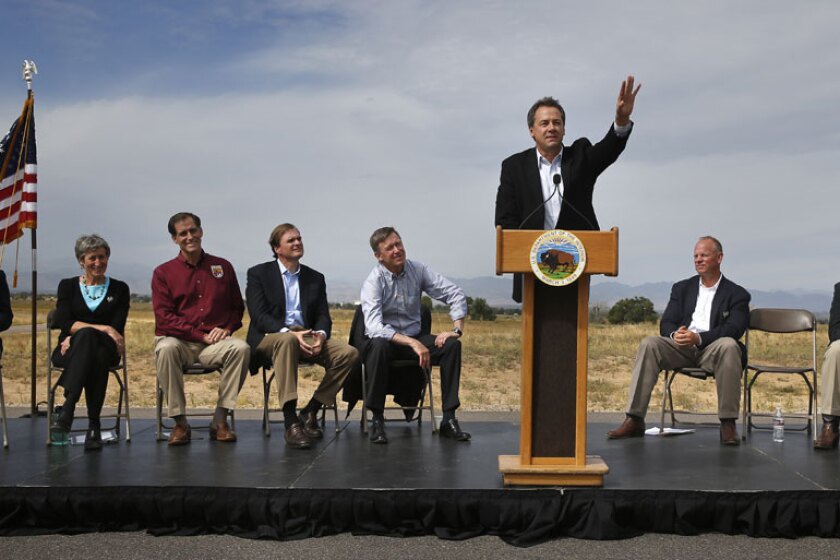
(Photographs by David Kidd/Governing)
Trump won 74 percent of the 2020 vote in Muhlenberg County, where Greenville is the county seat. This represents a huge switch. Muhlenberg County has historically been dominated by Democrats and all of the countywide posts are still held by Democrats. It wasn’t long ago that even the most conservative voters registered as Democrats, because there was practically nothing to vote for as a Republican during primary elections. “Just for so many years, there were few Republicans and rarely, rarely a Republican candidate,” says Harvey J. VanHook, vice chair of the county GOP.
He recalls that the first time he voted in the county, the clerk couldn’t find his name, since she wasn’t in the habit of looking at the list of registered Republicans. But Trump holds a special appeal to voters in parts of the country that feel left behind by big cities and the coasts, both culturally and economically. That’s certainly the case in Muhlenberg County.
The county once relied heavily on coal for employment, but most of the mines have closed. The Tennessee Valley Authority is shutting down much of a local coal-fired plant in favor of one fueled by natural gas. That economic shift has many Muhlenberg County residents driving an hour or more outside the county to find jobs that pay better than $15 an hour, working as mechanics or on road crews. “We’re not growing population,” says Doug Thompson, who ran unsuccessfully for the GOP nomination as county judge-executive this year. “People aren’t moving in and people are moving out to find jobs.”

It’s not only economic issues that have pushed voters in Muhlenberg County, along with much of rural America, away from Democrats and into the arms of Republicans. “I’ve seen so many people that were strong Democrats but changed because they felt that Democrats were not Christian,” says Greenville Mayor Jan Yonts. (She’s a Democrat but her office is nonpartisan.) “They feel that Democrats are baby killers.”
Along a commercial corridor in Central City, which is the most populous city in Muhlenberg County, a Baptist church is fronted by a 50-foot tall lighthouse with the name “Jesus” spelled out in enormous black letters along two sides. Churchgoers in Central City have plenty of other choices for places to worship. “Religion makes a big impact here,” says Jack Reno, who chairs the Muhlenberg County Democratic Party. “Rural Kentucky is very much religion first, guns second.”

“I’ve had a lot of discussions with my neighbor and he was actually surprised I was a Democrat,” says Brittney Hernandez-Stevenson, the party’s candidate for state House seat in the county. “Some of the support that I think I would get, I may not, unless they pay attention to me as a person and the things I’ve done, versus my party.”
An All-Urban Party
Biden won 91 of the nation’s 100 largest counties in 2020, but hardly anywhere else. Although he won the most raw votes of any candidate in the nation’s history, he won the fewest counties of any presidential winner. Trump won about five times as many counties. The result reflected the fact that Democrats are thriving in major metropolitan areas, but tanking elsewhere.
At times, this seems almost like a party strategy. Obviously, more people live in urban areas than rural — the counties Biden won are home to 67 million more people than Trump counties — and Democrats have seemed dismissive of the need to appeal to rural voters. “The common refrain that ‘demography is destiny’ (refers) to the misguided belief that any year now the swelling suburbs and urban centers will hit a tipping point enabling Democrats to overcome the lopsided votes from our declining rural communities,” write Chloe Maxmin and Canyon Woodward in their new book Dirt Road Revival, about the need for Democrats to compete in rural areas. (Maxmin is a Democratic state senator from a rural district in Maine and Woodward was her campaign manager.)
There’s hardly an economic or health indicator by which rural America doesn’t lag, whether it’s opioid addiction or life expectancy. During the decade between the Great Recession and the start of the pandemic, nearly all the economic growth took place in a fairly small number of metropolitan areas, making rural residents feel that the recession had never ended. The much smaller number of Biden counties accounted for 70 percent of the nation’s economy at the time of the election. Being told to “check your privilege” when you’re struggling naturally grates.

During his first run in 2016, Trump spoke directly to small-town concerns, promising to bring back coal and steel jobs. That didn’t happen, and even before taking office Trump’s transition team was talking about eliminating the Tennessee Valley Authority. But Trump certainly delivered on cultural issues — a fact punctuated by the recent Supreme Court decision overturning abortion rights under Roe v. Wade.
There are plenty of counties in Kentucky that, like Muhlenberg, supported Democrats for president until recently, but now are overwhelmingly Republican. Elliott County, in the eastern part of the state, had never once voted Republican for president — over its 144-year history, the longest streak in the nation — but Trump took 75 percent of the vote there in 2020.
There’s a car driving around Muhlenberg County with a bumper sticker that says “LGBT,” only the L stands for liberty, the G for guns, the B for beer and the T for Trump. Perry O’Bannon, who works for the Greenville Street Department, sums up Trump’s appeal succinctly. “I was raised a Democrat,” he says, “and Trump, he didn’t take no crap.”
Muhlenberg's Shifting Landscape
Greenville Mayor Yonts is the widow of Brent Yonts, who represented Muhlenberg County in the Kentucky House for 20 years. He was unseated in 2016, not only the year Trump got elected but the election in which the GOP took control of the Kentucky House. At the time, it was the only chamber in the South still held by Democrats.
Brent Yonts lobbied officials with the TVA and the EPA to keep local coal operations open, but to no avail. As a Democrat, he took the blame, or enough of it to lose his seat. “Yonts got blamed because (a coal-fired power plant) didn’t get built,” says Reno, the Democratic county chair. “There was nothing a state rep could do about it because the EPA wasn’t going to grant a permit for it.”


It’s an issue for the party throughout the region. “Now, from I-65 westward, there is only one Democrat in the House in Kentucky,” Mayor Yonts says, referring to the interstate that divides that commonwealth from Louisville to the north through Bowling Green to the south.
It’s happened all across the South. For a century following the Civil War, the South was effectively under one-party, Democratic rule. But southerners started voting for Republicans in response to civil rights legislation, first for president, then U.S. Senate and on down the ballot. Just this month, the number of registered Republicans in Kentucky has exceeded the number of Democrats for the first time. Democrats still enjoy a hefty registration advantage in Muhlenberg County, but clearly many people who haven’t switched formally are voting for the GOP.
Republicans are convinced this is the year they’ll make inroads in county offices, although the party didn’t bother fielding a candidate for sheriff. “Democrats aren’t the way they used to be,” says a woman in Central City who asked to be identified only as Annie. “Democrats, as far as the larger level, they’ve gone so far to the left — what sex are you, what’s taught in schools.”
Local Ties
Jordan Baize was another unsuccessful hopeful for the GOP nomination for county judge-executive this year. “My parents were conservative but not Republicans,” he says, “because in our area you had to be a Democrat to have anything to vote on.”
A few days before the primary, Baize moved a portable billboard bearing his own likeness from a gas station along a frontage road to an auto parts store at the center of town. As he hitched the billboard to the back of his white pickup, Baize received plenty of friendly waves and honks. “Small-town politics,” he says.
Reno says that small-town politics still matter. He comes from a long line of Democratic activists — his great-grandfather was Indiana coordinator for Harry Truman, his grandfather held that job for Robert F. Kennedy and his dad was a state party treasurer for decades. Reno is always begging candidates running for federal office to show up in the county, to look people in the eye to take credit for projects or let them know their concerns are being heard.

There’s not as much talk as there used to be about getting parking tickets fixed if you vote the right way, but politics in Muhlenberg County remains informal. Everyone calls local officials by their first names. Reno himself seems to know just about everyone eating in the Mexican restaurant where his daughter works as a waitress, or taking a smoke break outside. “Our jailer, his name’s Terry Nunley,” Reno says. “He’s related to every Nunley, Shemwell, Penrod and Whitehouse in the county. That right there is about 10,000 people. I’m not kidding.”
Hernandez-Stevenson runs the Muhlenberg campus of Madisonville Community College and sits on a slew of community boards. She hopes that reinforcing personal connections will help her win back the state House seat Yonts lost six years ago. She does share her fear that some people might not “accept me or want to vote for me” because she is a Black woman. Muhlenberg County is 93 percent white, but seven of the 20 people on the county Democratic committee are African American.

“I’m here to serve this community,” Hernandez-Stevenson says. “I want people to realize that I’m here to listen to them and figure out what they want done in this district, vs. focusing on some of the national issues that we really have no control over.”
Her challenge is that all politics is not local. Politics are highly nationalized, making it difficult for Democrats not just in Muhlenberg County but throughout rural America to persuade voters they won’t rubber stamp ideas being pushed by national party leaders from New York and San Francisco.











